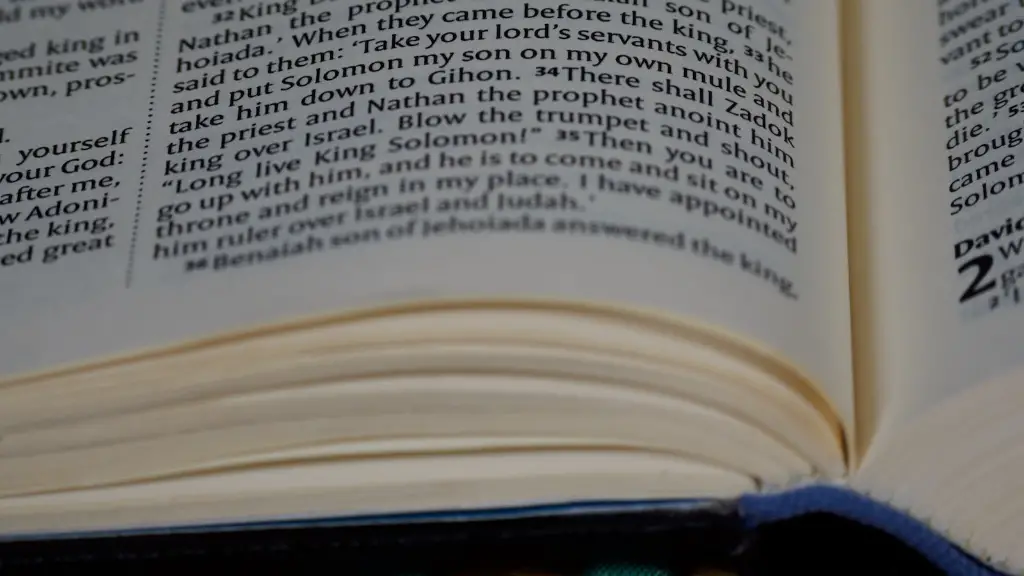The Big Bang Theory
One scientific perspective on the age of the universe is the Big Bang theory. According to this theory, the universe was created 13.8 billion years ago from a singularity – a point of infinite density containing all of the energy of the universe. This initial singularity then expanded and cooled, forming the galaxies, stars, planets and everything else that makes up our universe today.
This theory is supported by a wide range of scientific evidence such as cosmic microwave background radiation – the leftover light from the Big Bang – and observations of the expansion of the universe. However, it does contradict many of the core beliefs outlined in the Bible regarding the creation of the universe.
Biblical Perspective on the Age of the Universe
According to the Bible, the universe was created in six days, with the first day consisting of God creating light. This narrative is outlined in the Book of Genesis, with God commanding “Let there be light!” and subsequently creating all of the other fundamental elements of the universe over the course of the next five days.
Many believe that this narrative is not intended to be taken literally, but rather as a metaphor for the creation of the universe. From this perspective, it is easy to see why the Bible does not give a specific age for the universe – because it may have no real answer.
This interpretation of the Genesis narrative is supported by the majority of modern Christian and Jewish theologians, who believe that the universe was not created in a literal six days, but that time is a relative concept that God exists outside of and is not subject to.
Common Creationist Perspectives
There is also a wide range of perspectives from creationists – those who believe in the literal interpretation of the Bible – on the age of the universe. Many creationists are open to the findings of modern science and accept that the universe is likely much older than the six days outlined in the Bible.
However, there is also a vocal minority of creationists that claim the Big Bang is a “secular explanation” and believe the universe is only a few thousand years old. This perspective is based on the idea that the universe was created in a single, instantaneous event – a literal interpretation of the Genesis narrative.
In addition, some creationists believe that God created the universe with the “appearance of age” – that is, God created the universe with the appearance of being much older than it is in reality.
The Evidence for the Universe’s Age
The age of the universe has been a subject of debate for centuries, with new evidence and theories being presented on a regular basis. While the debate continues to rage, a mountain of scientific evidence suggests that the universe is much older than a few thousand years.
The rate of expansion of the universe, its large-scale structure, and its distribution of matter and energy all point to an age of 13.8 billion years. Of course, the debate is far from over and likely won’t be resolved until we have a better understanding of the universe and how it was created.
The Bible and the Age of the Universe
Despite the scientific evidence, there is a widely shared belief in the literal interpretation of the Bible’s creation narrative. This belief has been propagated in the media and popular culture, and has resulted in a widely shared misunderstanding of the age of the universe.
Evidence from both science and scripture suggest that the universe is much older than the six days outlined in the Bible. Regardless of one’s perspective on the creation narrative, it is clear that the universe is much older than a few thousand years.
Non-Biblical Theories on the Age of the Universe
In addition to the Big Bang theory, there are numerous non-biblical theories on the age of the universe. These range from the Hindu tradition of an “eternal universe”, to the Chinese philosophical concept of the universe oscillating between “complete chaos” and “eternal order”.
Many of these theories share a common perspective on the age of the universe – that it is much older than a few thousand years. This is in stark contrast to the literal interpretation of the Genesis narrative, which suggests that the universe was created in six days.
The Impact of Modern Science
The development of modern science has completely changed the way that we view the universe. The scientific perspective has influenced our understanding of the age of the universe, leading many to reject the literal interpretation of the Genesis narrative.
The development of new techniques and technologies has enabled scientists to explore the universe, allowing them to make increasingly precise measurements and gain a better understanding of its age and structure. This has led to a wealth of new evidence that suggests that the universe is much older than the six days outlined in the Bible.
Implications Of The Age Of The Universe
The implications of the age of the universe go beyond questions of religion, as it is intertwined with the development of human civilization and our understanding of the universe. Our view of the universe has changed drastically over the past centuries, as we have moved away from a static and static, towards a dynamic and ever-expanding universe.
This is an important shift in perspective, as it implies a universe that is constantly changing and evolving. While this may be at odds with some interpretations of the Bible, it is a key part of modern science and our understanding of the laws that govern the universe.
Scientific Myths
Despite the overwhelming scientific evidence, there are still many myths and misconceptions about the age of the universe. One of the most common is the idea that the universe is only a few thousand years old. This overlooks the vast range of scientific evidence that suggests the universe is much older than this.
Another common misconception is the idea that scientific theories, such as the Big Bang, are incompatible with religious beliefs. This is untrue, as many mainstream religious perspectives accept the Big Bang and other scientific theories, while viewing the universe’s creation narrative as a metaphor.
Educating About The Age Of The Universe
The debate over the age of the universe is ongoing, but it is clear that there is a wealth of scientific evidence that suggests the universe is much older than a few thousand years. The key is to educate the public on this evidence and dispel the many myths and misconceptions that exist about the age of the universe.
It is important for people to understand that science and religion are not at odds, and that many religious perspectives accept the findings of science and view the creation narrative as a metaphor. Education is the key to understanding this crucial issue, and to moving forward with a greater understanding of the universe.





